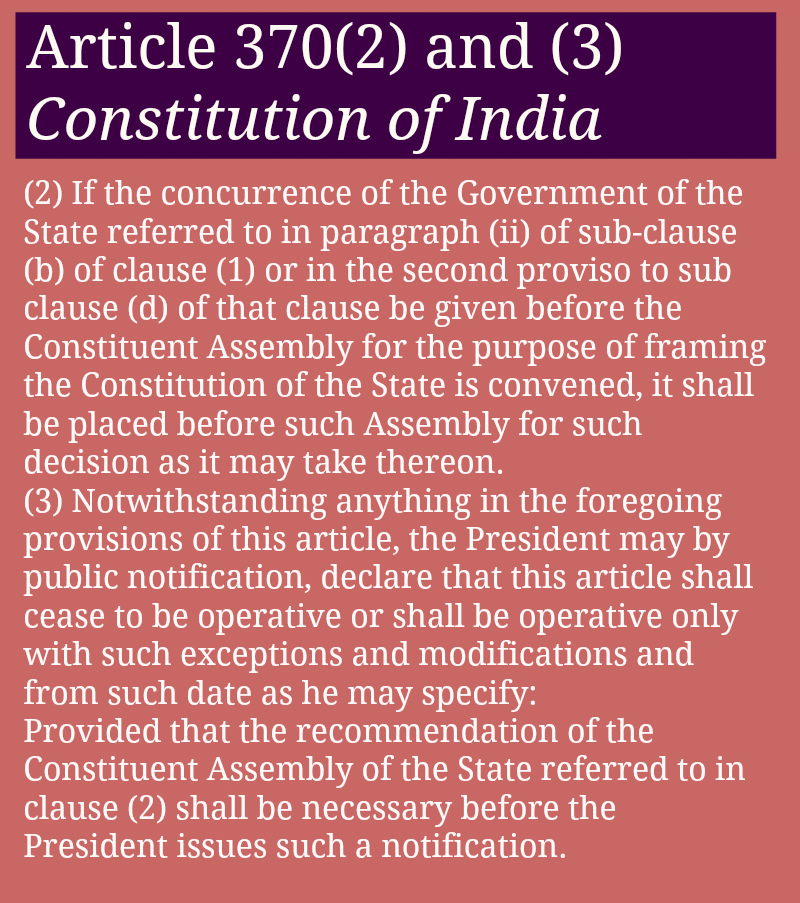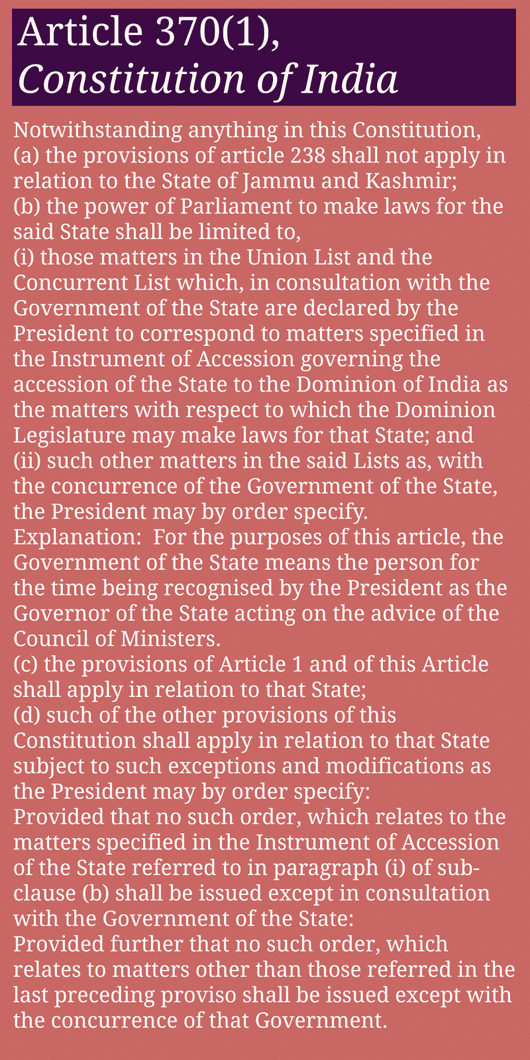 Prime Minister Narendra Modi revived the debate over Article 370 of the Constitution of India during his election campaign. A brief tour of the factors that influenced the drafting of that constitutional provision and the interpretation of its text will provide better context to the debate that has followed Mr. Modi’s remarks. These factors include some of the events that transpired between the departure of the British from the subcontinent in August 1947 and the adoption of the Constitution of Jammu and Kashmir in January 1957.
Prime Minister Narendra Modi revived the debate over Article 370 of the Constitution of India during his election campaign. A brief tour of the factors that influenced the drafting of that constitutional provision and the interpretation of its text will provide better context to the debate that has followed Mr. Modi’s remarks. These factors include some of the events that transpired between the departure of the British from the subcontinent in August 1947 and the adoption of the Constitution of Jammu and Kashmir in January 1957.
The events that should inform any discussion about Article 370
Out of the 562 princely states in India, Kashmir was among those that the British did not rule directly. The British government transferred the state forever to Maharaja Gulab Singh under the Treaty of Amritsar, 1846, and fixed a nominal annual payment to protect his territories from external enemies. A key development in the history of Jammu and Kashmir in the twentieth century is the crystallisation of the popular opposition to the Maharaja’s rule through the Jammu and Kashmir National Conference, led by Sheikh Abdullah. With India’s independence, Maharaja Hari Singh, the ruler of Kashmir in 1947, had three options: to remain independent, merge with India, or merge with Pakistan. Pressing the Maharaja, who initially wanted to remain independent, to accede to India, Prime Minister Jawaharlal Nehru, in one of his letters said,
“It is of the most vital importance that Kashmir should remain in the Indian Union. But however much we may want this, it cannot be done ultimately except through the goodwill of the mass of the population. Even if military forces held Kashmir for a while, a later consequence might be a strong reaction against this. Essentially, therefore, this is a problem of psychological approach to the mass of the people and of making them feel being in the Indian Union will benefit them. If the average Muslim feels that he has no safe or secure place in the Union, then obviously he will look elsewhere. Our basic policy must keep this in view, or else, we fail.”

When Hari Singh declared Jammu and Kashmir independent in 1947, Pakistan immediately launched a guerrilla war to free the region, which had a majority of Muslims, from Hindu rule. The Maharaja, realising his inability to protect his territory, requested the Indian government for help. The Indian government insisted that Kashmir accede to India before it would send its army. The Maharaja agreed to the same and the Indian government and the Maharaja signed the accession treaty (“the Instrument”) on October 26, 1947.
Importantly, Clause 5 of the Instrument said that it could not be altered without the state’s consent. Clause 7 specifically protected the state’s right to ratify the application of any future constitution of India in its territory. It read:
“Nothing in this Instrument shall be deemed to commit me in any way to acceptance of any future Constitution of India or fetter my discretion to enter into arrangements with the Government of India under any such future Constitution.”
The Instrument did not result in the merger of Kashmir – governed by its own Constitution of 1939 – into India and only created a temporary settlement under which India’s government would look after the subjects of defence, foreign affairs, and communication while Kashmir would have its own constitution, flag, and Prime Minister. In a broadcast on November 2, 1947, Nehru spoke of the temporary nature of the Instrument.
“…Both the Kashmir government and the National Conference pressed us to accept this accession and to send troops by air, but made condition that the accession would have to be considered by the people of Kashmir later when the peace and order were established…”
 Some of the other important events that influenced the drafting of Article 370 were the political turmoil in Jammu and Kashmir, the United Nations resolutions calling for a plebiscite in the state on the issue of accession to India, the governments of both India and Pakistan establishing political control over the territories of Kashmir under their control, and the representatives of all the other states choosing, in India’s Constituent Assembly, to not assert their right to separate constitutions.
Some of the other important events that influenced the drafting of Article 370 were the political turmoil in Jammu and Kashmir, the United Nations resolutions calling for a plebiscite in the state on the issue of accession to India, the governments of both India and Pakistan establishing political control over the territories of Kashmir under their control, and the representatives of all the other states choosing, in India’s Constituent Assembly, to not assert their right to separate constitutions.
Jammu and Kashmir, unlike the other princely states, was not willing to accept the Constitution of India and was adamant on acting only on the basis of the terms of Instrument, specifically Clause 7. Gopalaswami Ayyangar, a Minister without portfolio in Nehru’s government, moved the Bill for Article 370 in India’s Constituent Assembly. He made the following argument.
“Till India became a Republic, the relationship of all the States with the Government of India was based on the Instrument of Accession. In the case of other Indian States, the Instruments of Accession will be a thing of the past in the new Constitution; the States have been integrated with the Federal Republic in such a manner that they do not have to accede or execute a document of accession for becoming units of the Republic. It would not be so in the case of Kashmir since that particular State is not yet ripe for this kind of integration due to special conditions prevailing in Kashmir. In the first place there has been a war going on within the limits of Jammu and Kashmir State — part of the State is still in the hands of the enemies, and in the second place, the Government of India have committed themselves to the people of Kashmir in certain respects. They have committed themselves to the position that an opportunity will be given to the people of the State to decide for themselves the nature of their Constitution.”
Sardar Patel, the then Minister of States in India, declared in the Constituent Assembly,
“In view of the special problem with which the Jammu and Kashmir Government is faced, we have made special provisions for the continuance of the State with the Union on the existing basis.”
Soon after India adopted its constitution, the National Conference’s leader Sheikh Abdullah — the interim Prime Minister of the state and the most popular leader of the state’s Muslims —called for independence from India. The government of India dismissed his government and placed him in preventive detention. Seven years after the Constitution of India was adopted, the Constitution of Jammu and Kashmir came into full force. Among its 158 sections is Section 3, which clearly states that, “The State of Jammu and Kashmir is and shall be an integral part of the Union of India” and is not amenable to change even using the amending provisions of that constitution.
Apart from these events, we can also learn much from the text of Article 370, including the use of the word “temporary” in its title.
Lessons from the text of Article 370
Mr. Ayyangar had said in the Constituent Assembly that Article 370 is labeled a ‘temporary’ provision in order to keep the door open for the day when the state of Jammu and Kashmir would merge with India and fully accept the Constitution of India.
Sub-clause (a) of Clause (1) states that Article 238, which regulated the relationship between the Union and the princely states before the Seventh Amendment repealed it in 1956, shall not apply in relation to Jammu and Kashmir. Sub-clause (b) provides that the Parliament can make laws for the state of Jammu and Kashmir on matters in the Union and the Concurrent Lists (in Schedule Seven of the Constitution of India) only if the President (after consultation with the government of the state) declares that such a subject fits the description of the matters of defence, communication, finance, and external affairs. Sub-clauses (c) and (d) make it clear that at the time the Constitution came into effect, only Article 1 – which defines the components of the Union of India – and Article 370 itself, applied to the state. Other constitutional provisions can only be made applicable to the state with the agreement of the state government.
Therefore, even though Jammu and Kashmir is a constituent state of the Union of India under Schedule 1 of the Constitution of India, it is exempt from many provisions of the Constitution and is even allowed to have a separate constitution. With Union laws – other than those governing the subjects of defence, external affairs, finance, and communications – not applicable to the state without the permission of the government of Jammu and Kashmir, the state’s residents live under a separate set of laws, including those related to citizenship, ownership of property, and fundamental rights. The provisions of Article 370 and the other exceptions in the Constitution regarding the state have created a unique relationship between the Union government and the state. As MP Jain points out, “the two characteristic features of this special relationship are, (1) the State has much greater measure of autonomy and power than enjoyed by the other States and (2) Centre’s jurisdiction within the State is more limited than what it has with respect to other States.”
Today, a number of provisions of the Constitution of India stand extended to the state of Jammu and Kashmir. Important amongst these are Article 356, which deals with the imposition of President’s rule in a state and the jurisdictions of the Supreme Court, the Election Commission, and the Comptroller and Auditor General. There is however, a vast area that still remains under the exclusive jurisdiction of the state government. The Indian Penal Code, 1860, the Prevention of Corruption Act, 1988, the Religious Institutions (Prevention of Misuse) Act, 1988, and the Delhi Special Police Establishment Act, 1946 are some crucial Union laws that are not at all applicable to the state. The Protection of Human Rights Act, 1993, the Commissions of Inquiry Act, 1952, the Unlawful Activities (Prevention) Act, 1967, and the Representation of the People Act, 1951 are only partly applicable.
Can Article 370 be amended under the provisions of the Constitution?
 The answer is no. Article 368, which contains the provisions governing the amendment of the Constitution, applies to all the other states of India except Kashmir. In relation to Kashmir, a proviso has been added to Article 368 by the Constitution (Application to Jammu and Kashmir) Order, 1954, which says that no constitutional amendment “shall have effect in relation to the State of Jammu and Kashmir” unless applied by an order of the President of India, under Article 370. Clause 3 of Article 370 states that the President can issue a notification to cease the operation of Article 370 or to restrict it operation only on the recommendation of the Constituent Assembly of the state.
The answer is no. Article 368, which contains the provisions governing the amendment of the Constitution, applies to all the other states of India except Kashmir. In relation to Kashmir, a proviso has been added to Article 368 by the Constitution (Application to Jammu and Kashmir) Order, 1954, which says that no constitutional amendment “shall have effect in relation to the State of Jammu and Kashmir” unless applied by an order of the President of India, under Article 370. Clause 3 of Article 370 states that the President can issue a notification to cease the operation of Article 370 or to restrict it operation only on the recommendation of the Constituent Assembly of the state.
Thus any modification or deletion of this Article requires the recommendation of the state’s Constituent Assembly — an improbable condition, given that the Constituent Assembly of Jammu and Kashmir was dissolved in November 1957.
A solution that has been suggested to this obstacle is an amendment of the Constitution of India to remove the requirement that the recommendation of the Constituent Assembly is necessary to remove the Article. But even such an amendment under Article 368 requires issuance of a Presidential order under Article 370, which in turn will require the state government’s concurrence by the President under Clause (1)(d) of the current provision.
The consequences of repeal
Given that Article 370 represents Jammu and Kashmir’s “unique relationship” with India, a probable consequence of its repeal would be the undermining of the position of the state in relation to India. A.G. Noorani has argued that Article 1, which lists the territories of India, is applicable in relation to the state of Jammu and Kashmir only through Article 370 and that, therefore, the extinction of Article 370 would mean the exclusion of Jammu and Kashmir from the constitutionally listed territories of the Union of India. If, as he says, the application of Article 1 to Jammu and Kashmir is subservient to Article 370, the abrogation of Article 370 would sever the constitutional link between India and Jammu and Kashmir and the Indian constitution will automatically cease to be applicable to Jammu and Kashmir. As the former Chief Justice of the Jammu and Kashmir High Court, BA Khan argued last year, “if Article 370 is abrogated, then technically and legally, the foundation of Jammu and Kashmir’s accession to India would cease to exist.”
(Richa Kaur is part of the faculty on myLaw.net.)
(The article has been amended to reflect the fact that the proviso to Article 368 for the purpose of Jammu and Kashmir, has been added by the Constitution (Application to Jammu and Kashmir) Order, 1954. – Ed.)

